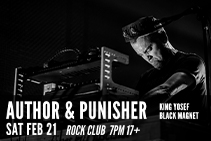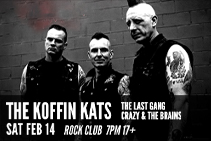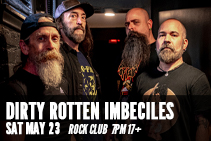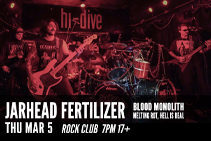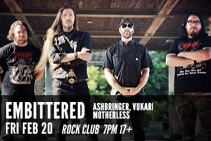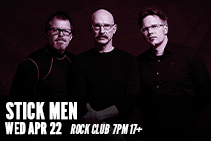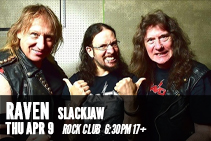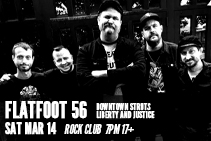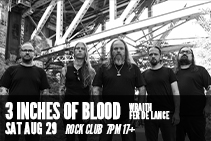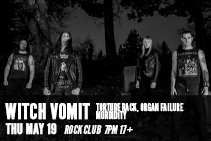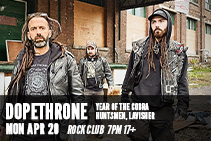

3TEETH
Iconoclastic 3TEETH frontman Alexis Mincolla is dedicated to exploring the relationship between archetypes, mythologies, history, and the hypocrisy of the human experience. “We’re constantly dissecting the space between chaos and order in the eternal psychic battle between forces with opposing beliefs or perspectives, that we call the cosmic taint,” he says.
3TEETH use corrosive rhythms, acerbic samples, blazing guitars and a confrontational polemic to inspire listeners to question the ideologies that we hold sacred. It’s the same kind of musical activism sparked by groups like MC5 in the ‘60s and reignited in the ‘90s by Rage Against the Machine.
“I saw Rage four times when I was a kid and that had a profound effect on me,” says Mincolla, who holds two political science degrees. “I took out Che Guevara’s ‘Guerrilla Warfare’ from the library in seventh grade because I wanted to know who this guy on the t-shirt was. And that stuck with me.”
The dualities between the left and the right, the haves and the have nots, and the variegated results of governmental oppression and total anarchy are touchpoints for 3TEETH, a band that doesn’t believe in aphorisms or absolutes and seeks liberation through angry, yet accessible music. The band’s third album, METAWAR, is a powerfully political compendium of songs which are both enlightening and infectious.
“I wasn’t writing for the left or the right or anything like that,” Mincolla says. “I just wanted to write stuff that reflected the whole insane, absurdist political theater and wrap it all up in this nihilistic approach of bringing it all to an end. There’s something really rewarding about creating this funhouse mirror that we’re holding up to things like the military-industrial complex. You warp it in this sardonic way and reflect it back at people – it’s like sucking the poison out of the mass-production society and then spitting it back in its own fucking face.”
Having established themselves and cemented a following with their first two albums, 2014’s self-titled debut and 2017’s <shutdown.exe>, and having toured with Tool, Rammstein, Danzig and HIM, 3TEETH is in a good position to lash out with their most fiery, catchy and confrontational album to date, METAWAR. Mincolla and his bandmates started working on the songs in their home studio. When they had a batch of material they were happy with, they called industrial music guru Sean Beavan (Nine Inch Nails, Marilyn Manson) to produce the album. And this time, there were no external distractions.
“This was the first record where we weren’t working side jobs and just getting together on free time and cobbling together a record,” Mincolla says. “We put our total focus into this and that helped us find our real sound and hone it. We self-produced our first two albums, and that was cool, but having a producer as experienced as Sean to help push us really brought out our best. And we had a fucking blast.”
One listen to the syncopated beats, misanthropic vocals and uncanny melodies of the opening track “AFFLUENZA” illustrates 3TEETH’s determination to stretch boundaries and shatter preconceptions. The rest of the album is just as impacting. The first single, “AMERICAN LANDFILL,” starts with a sample redolent of industrial chainsaws and the threatening sound clip, “You gonna buy American next time?” Then, the track launches into a surging number fueled by the contempt of ignorance and a celebration of decay. Mincolla’s vocals see-saw from aggro screams to haunting melodic crooning and the band compliments his delivery with chugging riffs, pulsing keyboards and battering ram beats.
In addition to drawing inspiration from the biggest names in industrial music, 3TEETH are well-schooled in the pioneering demolition of the scene’s progenitors, including Skinny Puppy, Front 242 and KMFDM, to name a few. In addition, the band is inspired by the skewed sounds of bands such as Tool, Sepultura and Deftones.
“Time Slave” is a mid-tempo barrage of pummeling rhythms, piercing synths and driving riffs colored by a tuneful refrain and “President X,” which begins with an ominous whoosh that morphs into the shouts of a riotous crowd, is a masterful mélange of mechanized vocals, martial beats and keyboards that compliment the scathing, non-partisan message.
“We’re really trying to find a weird space in between everything else that is maybe anti-systemic, that isn’t on the left or the right, and is underrepresented,” Mincolla says. “On ‘PRESIDENT X,’ we’re not making fun of President Trump. We’re making fun of every president. It doesn’t make a difference who the president is. It’s all the same bullshit.”
Digging underneath conventional wisdom to reveal the rotting underbelly and impure motivations of the corporate mainstream is a major part of 3TEETH’s aesthetic and Mincolla relies on his knowledge of numerology, theology, sociology and history to wake the complacent pacified by misinformation and call out the parasites that feed off the ignorant. Even the band’s name is a means of bonding with the enlightened and educating the curious.
“3TEETH is this cryptic way of explaining the Trident, which is the divine weapon of creation and destruction of the gods,” he says. “But I like codifying it in this very gritty and almost disgusting way. You hear 3TEETH and maybe you think of a meth addict or someone who has been smashed in the mouth. So, you’re either in the know or not, and if you don’t know, it almost has a guard up against you unless you really want to delve into it.”
Understanding or interpreting the meaning beneath the surface has been important to Mincolla for years. One of his greatest epiphanies came when he was a 21-year-old college student and he was hanging out under a statue of Giordano Bruno. Unbeknownst to Mincolla, Bruno was a 15th Century Italian philosopher, astronomer, mathematician, and occultist whose theories predated modern science.
“While I was standing there, I was talking to my history professor and he explained that Bruno was burned at the stake,” Mincolla says. “The Catholic Church thought he was a heretic because he was interested in Numerology, Neoplatonism and other esoteric things that they condemned. When I found that out, I dove down this rabbit hole to learn about hermetic wisdom, symbology, the western occult, Rosicrucianism and Egyptian mythology. I dug as far back as ancient Sumerian origin texts like the Enûma Eliš where I became obsessed with this concept of the trident – it was the god Marduk who represented order, who killed Tiamat who represented chaos, thus creating the universe.”
Unlike most bands, which form to write songs, play gigs and maybe make some money, 3TEETH were born out of a synthesis of visual art, inventive thought and unconventional music. At the time, Mincolla was a creative director of an L.A. tech noir nightclub called Lil Death. Soon, after, he met keyboardist Xavier Swafford, with whom he had much in common. “I found out we actually lived next to each other and he was a producer,” Mincolla says “We started getting together and making some music but we were really just doing it because we were bored. Then we got more into it. Having a background as an art director, I started creating all this memetic force by creating imagery and leaking teasers about what we were doing. Everyone was like, ‘Who are these guys and where do they come from?’ That’s when we thought, ‘Damn, maybe we should just keep writing and do a record.’”
Mincolla and Swafford outsourced guitar and drum duties to various friends and peers until they teamed up Andrew Means (modular synth/ bass), Chase Brawner (guitar) and Justin Hanson (drums). In 2014, the members of 3TEETH met up once or twice a week to work on what became their self-titled debut album. A year later, an indie label in Toronto offered them a deal. As part of the contract, Mincolla stipulated that the album be released in limited edition on vinyl, which the record company was initially against.
“At that point, I didn’t know I wanted to be in a band and tour,” he says. “I just knew I wanted to have an album on vinyl so when I was 50 I could hold up the record and say, ‘Hey, look what I did.’ Because I remember my older brother saying to me, ‘It’s not final until it’s on vinyl,’ and that phrase stuck with me. The label said, ‘We don’t do debuts on vinyl. It’s costly and we’re small and we don’t want to lose our shirts.’ And I said, ‘Guys, if we produce this vinyl, I promise I’ll make sure it all sells.’ They agreed and I started creating all this memetic culture around the band and the visuals. It caused all this hype and the pre-orders started flying. The next thing I knew, we started getting offers for shows. We didn’t even have a manager at that point.”
Adopting a DIY approach, Mincolla served as the band’s manager, booking agent, publicist and frontman. 3TEETH’s first show was at an L.A. club called Complex and the place was packed. Somehow, the band’s second show was at a small summer festival in Canada in front of more than 2,000 people. “We absolutely fucking smashed it,” he says. “It was super kinetic and we had so much fun,” Mincolla said. “Everyone was going ‘Where did these guys come from? What’s going on? It doesn’t make any sense.’ Ever since then, we’ve never looked back. I booked shows in week to two-week long runs whenever we had the time.”
Shortly after, Mincolla met Tool guitarist Adam Jones when the two were groomsmen at the wedding of a mutual friend. During the downtime, the two rockers nerded out about video games, and when the wedding was over, they exchanged information so they could play games together over the internet. The whole time, they never talked about Tool — one of Mincolla’s favorite bands — and the singer never mentioned he had his own group. About a year after the wedding, Jones and Mincolla were hanging out when Jones mentioned the inevitable.
“Hey Lex, why didn’t you tell me you had a band?” Mincolla recalls Jones saying. “Well, because you’re Adam from Tool. I’m sure everyone’s like, ‘Hey, look at my fuckin’ band.’” he responded. “Well, you’re right,” acknowledged Jones. “But I just saw a video you guys did and it was really awesome. I’d love to see you play live sometime.’”
It was a pivotal moment for 3TEETH. Jones attended one of the band’s show at the Viper Room in L.A. and had a great time. Jones then played 3TEETH’s self-titled album for his bandmates, who also dug the industrial vibe of the music. In the end, they agreed to invite 3TEETH to open for them and Primus in early 2016. Suddenly, 3TEETH went from playing for crowds of about 500 to performing for 20,000 ravenous Tool fans in sold-out arenas. “Before we went out with them, I was psyched, but I just didn’t feel prepared at all,” remembers Mincolla. “I didn’t even know what an arena sounded like from the stage. Did we have to switch gear or use monitors? I just knew nothing. But it’s one of those things where you don’t go, ‘Hey, sorry man. I’m not ready. Can we try it next year?’ You just fuckin’ do it. You get thrown into the water and you sink or swim. We did 30 dates and somehow, we didn’t get booed. The crowd liked it, and once you get a taste of that arena blood and what it feels like to get applause in that environment, you’re all, ‘Cool, I only want to play arenas from now on.’”
When 3TEETH returned from the road, they went back into the studio and wrote their second album, <shutdown.exe>, which peaked at #23 on Billboard, and expanded the band’s following. In no time, 3TEETH were headlining clubs and opening tours for Rammstein, Danzig and HIM in the U.S. and Europe.
As they began the process of writing their third album, 3TEETH strived to write heavier, more aggressive songs with strong hooks that would appeal to arena audiences as well as club dwellers.
“I knew it was time to kick this thing into overdrive, “Mincolla says. “In my mind, this was our first official record. I knew I wanted the songs to have strong messages, but at the same time, I wanted to make an album that could appeal to 20,000 people who all wanted to rock out at the same time. I purposely didn’t want to be so heavy-handed that it wasn’t fun. I wanted there to be a certain amount of mindlessness in the music because I think mindlessness in mindfulness. They actually make very good bedmates. If you’re gonna say something really important you don’t want to come across as preachy.”
From the slow, brooding intro to “ALTÆR” to the moody, electronic pop-tinted “SURRENDER,” 3TEETH touch all the pleasure points for fans of metal, industrial, EBM and even new wave while injecting sobering, prescient themes about megalomania, media overload, and mass rebellion. 3TEETH’s reliance on pop culture tropes to overload and overthrow is especially evident in their cover of Foster the People’s mega-hit “PUMPED UP KICKS,” which is manipulated, twisted and abused until it’s an ugly transmogrification. And yet, it’s still fully recognizable to fans of the original.
“You might love it or you might hate it,” Mincolla says. “The point is to formulate your own opinion because you’re never going to get anything at face value anymore. We live in a post-information age where there’s a mutation chamber of identity politics that’s so pungent it’s next to impossible to extrapolate any real information about anything.”
“Our whole thing is about condemning our eyes in so many ways,” concludes Mincolla. “We’ve gotten to the point where even if you see something with your own eyes it doesn’t mean what you’re seeing is real, or maybe it’s just one side of reality. In the end, I think I just want people to think harder and to realize that if you’re not contradicting yourself with whatever you’re doing, you’re probably not thinking hard enough.”
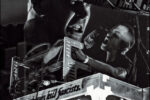
AUTHOR & PUNISHER
Tristan Shone, the creative core of Author & Punisher, started the project in 2004, setting out to craft devices (machines) as a force multiplier. That he could control machines to trigger a myriad of sound objects (synths et al.) was not just heuristic but revolutionary. Shone’s mechanical engineering and art background functioned perfectly as a catalyst to his songwriter form. To date, Author & Punisher has seven lauded full-lengths and one EP, the latest of which is Krüller. Shone’s unconventional yet assiduous methods with music and machine have landed crucial collaborations with Perturbator’s James Kent, and Tool’s Danny Carey and Justin Chancellor, who appear on Krüller tracks “Misery” and “Centurion,” respectively.

GOST
Gost exist in the dark crack between black metal and the most shadowy end of electronic music. Since the release of the Radio Macabre EP at the start of 2013, and the remorseless digital nightmare of their Skull debut album six months later, Texas-based multi-instrumentalist, producer and main-brain James Lollar has become an increasingly singular force in music. Far more aggressive and sinister than the synthwave he’s often grouped with, Gost is a harsh and unique digital nightmare that takes the listener right into the heart of the abyss. Now Gost return with their sixth album, and their most exhilarating and dangerous-sounding work to date, Prophecy. It’s a record that perfectly reflects the horror and grim anxieties of a world beset with religious and political overreach, and progress “being rolled back to the fucking 1950s”. “It’s about an imaginative fall of the Western civilization, the biblical end of the world – the rise of Satan and Armageddon,” says James. “In America, there’s been a big rise of scared, reactive Christianity again, and almost like a re-emergence of the Satanic Panic. So it felt like an appropriate time to bring Satan back into things.”


